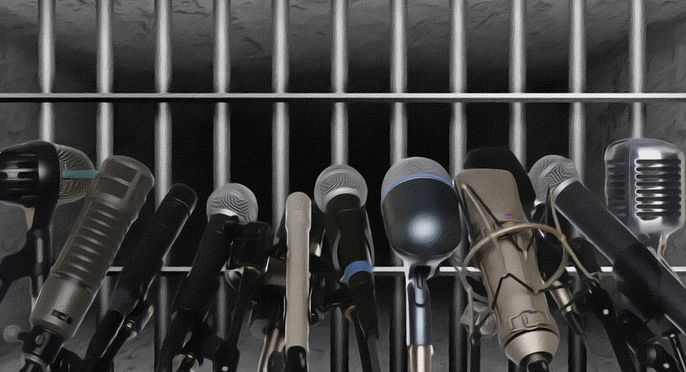Russia Ranks 162nd in Global Press Freedom Index
The human rights organization Reporters Without Borders (RSF) has released its latest annual World Press Freedom Index. According to the report, “Overall, the situation in Eastern Europe and Central Asia has worsened: press freedom is not guaranteed, and media outlets are increasingly used as channels for disinformation campaigns.”
Regarding Russia, RSF states that the country “continues its crusade against independent journalism, with more than 1,500 journalists having left the country since the ‘special operation’ began.” Russia’s rise by two positions to 162nd place is attributed to worsening conditions in other countries and actually masks a decline in its overall score. The list of journalists and media outlets labeled by the government as “foreign agents” or “undesirable” continues to grow, and journalists still face arbitrary arrests.
Key Findings from the RSF Report
- All private independent TV channels are banned from broadcasting, except for cable entertainment channels.
- Many Western media outlets, such as Euronews, France 24, and BBC, are no longer accessible in Russia without any legal, administrative, or judicial explanation.
- The media regulator Roskomnadzor has censored most independent news websites. The most popular ones, like Meduza and Dozhd, have been declared “undesirable organizations,” meaning that mentioning or quoting them can lead to criminal prosecution.
- The remaining media outlets are state-owned or controlled by Kremlin allies. Their staff must follow presidential administration directives on which topics to avoid and are subject to strict self-censorship. Radio stations face the same situation.
The report also notes that no journalist, even those who have left the country, is safe from the threat of serious charges based on “vaguely worded draconian laws, often passed in haste.” At the start of the COVID-19 pandemic, many laws related to freedom of expression, including those on defamation and “fake news,” were amended to be included in the Criminal Code. The “special military operation” accelerated this process: Parliament quickly passed amendments making “false information” about the Russian armed forces or any other Russian state body operating abroad punishable by up to 15 years in prison. Accusations of “extremism” and “justifying terrorism” are being used more frequently.
Despite a high level of internet connectivity, nearly two-thirds of Russians get their news mainly from television, which is government-controlled, and from Russian social networks like VKontakte. Topics related to LGBT issues and religious sensitivities have gradually become off-limits for the media. According to RSF, Vladimir Putin has actively encouraged this kind of conservatism in Russian society.
Impact of Sanctions and Censorship
Human rights advocates also note that the radical sanctions imposed by Western democracies in response to the “special operation” have sharply cut off much of the Russian economy from Europe, with which it was closely integrated, leading to great uncertainty. In addition to censorship, which has forced many media outlets to close and ruined the few remaining independent journalists—forcing them to change professions or emigrate—the advertising market has experienced serious fluctuations, especially affecting regional Russian media.
According to Reporters Without Borders, intimidation tactics against journalists now include not only physical violence, beatings, and even torture (mainly in the regions), but also frequent fines and short-term detentions on various pretexts. Media outlets are also at risk of being arbitrarily added to the “foreign agents” list, a status that brings heavy bureaucratic hurdles and legal risks, as well as the “undesirable organizations” list, which criminalizes any mention or cooperation with certain media. Facing increased risks after the start of the “special operation,” many journalists working for independent outlets have chosen to emigrate. Authorities continue to exert pressure by “visiting” their family members or convicting them in absentia.
Regional Comparisons and Additional Findings
According to RSF, only two countries rival Russia in terms of media repression: Belarus (167th place), whose regime persecutes journalists under the pretext of fighting “extremism,” and Turkmenistan (175th place), where the all-powerful president bans any independent information.
Georgia has also seen a significant decline, dropping 26 places to 103rd. The ruling party there “maintains societal polarization, fosters closer ties with Moscow, and pursues increasingly hostile policies toward press freedom.”
In the second half of April, the RSF website was blocked in Russia by order of an “unspecified government agency.” Roskomnadzor later explained that the reason was the publication of “unreliable socially significant information about the special military operation.”



